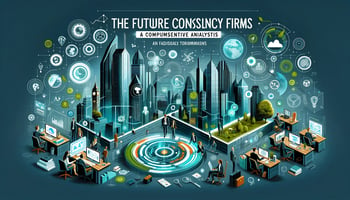Introduction The consultancy industry has long been a cornerstone of business strategy and...
Will A.I. Replace consultancy work?
 Artificial Intelligence (AI) has the potential to greatly transform various industries, including consultancy work. While AI can automate certain routine and repetitive tasks, making them more efficient and accurate, it is unlikely to completely replace the need for human consultants. Consultancy work often involves complex problem-solving, critical thinking, and decision-making, which require a deep understanding of business dynamics, interpersonal skills, and a human touch. These aspects are currently hard for AI to replicate.
Artificial Intelligence (AI) has the potential to greatly transform various industries, including consultancy work. While AI can automate certain routine and repetitive tasks, making them more efficient and accurate, it is unlikely to completely replace the need for human consultants. Consultancy work often involves complex problem-solving, critical thinking, and decision-making, which require a deep understanding of business dynamics, interpersonal skills, and a human touch. These aspects are currently hard for AI to replicate.
AI can complement consultancy work by providing data analysis, pattern recognition, and predictive modelling capabilities, enabling consultants to make more informed recommendations. AI can also assist in streamlining processes, enhancing productivity, and supporting decision-making. However, the expertise, experience, and strategic thinking provided by human consultants are still highly valuable and difficult to replace.
In summary, AI is likely to augment and enhance consultancy work rather than replace it entirely. It can support consultants by automating certain tasks and providing insights and analysis, but the human element in consultancy, including empathy, intuition, and creativity, remains crucial for the foreseeable future.
Let's delve further into how AI is likely to augment and enhance consultancy work rather than replace it entirely.
-
Data Analysis and Insights: AI has the capability to analyze vast amounts of data quickly and accurately. Consultants can leverage AI tools and algorithms to gather insights, identify patterns, and make data-driven recommendations. AI can uncover hidden trends and correlations that may not be immediately apparent to humans, enabling consultants to provide more informed and precise advice to their clients.
-
Process Automation: AI can automate repetitive and time-consuming tasks in consultancy work. This can free up consultants' time, allowing them to focus on higher-value activities. For example, AI-powered chatbots can handle basic client inquiries, scheduling, and document management, leaving consultants more time for value-added tasks such as strategy development and client engagement.
-
Decision Support: AI algorithms can assist consultants in making complex decisions by providing simulations, scenario analysis, and risk assessments. By leveraging AI models, consultants can evaluate multiple options, assess potential outcomes, and make more accurate and informed decisions. However, the final decision-making still rests with the human consultant, who can consider a broader range of factors and exercise judgment.
-
Expertise Augmentation: AI can act as a knowledge repository, providing access to vast amounts of information and expertise. Consultants can leverage AI-powered tools to access real-time market data, industry reports, and best practices. This can enhance their domain knowledge and help them stay updated with the latest trends and developments, enabling them to provide more valuable insights to clients.
-
Client Relationship Management: AI can support consultants in managing client relationships more effectively. AI-powered analytics can analyze client behaviour, preferences, and feedback, enabling consultants to personalize their services and tailor their advice to individual client needs. Additionally, AI can assist in predicting client requirements and identifying potential upselling or cross-selling opportunities, leading to improved client satisfaction and business growth.
Despite these advancements, certain skills and traits that human consultants possess are challenging for AI to replicate. These include emotional intelligence, empathy, creativity, adaptability, and the ability to build strong interpersonal relationships. The human touch in consultancy work is essential for understanding nuanced client needs, navigating complex organizational dynamics, and providing customized solutions.
In conclusion, AI is expected to enhance and complement consultancy work by automating tasks, providing data-driven insights, and supporting decision-making. However, human consultants will continue to play a crucial role in providing expertise, strategic thinking, and fostering meaningful client relationships. The collaboration between AI and human consultants can result in more efficient, effective, and valuable consultancy services.


.png?height=200&name=Blog%20why%20hire%20an%20interim%20manager%20(1).png)
